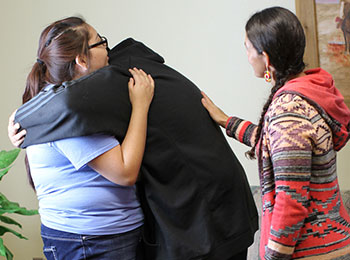April is Sexual Assault Awareness Month

One of the most important things Advocates at Cheyenne River Indian Outreach do is help victims understand they are not alone. Robin, Sexual Assault Coordinator and Advocate, shares her story.
After receiving her GED in 1996, Robin worked part-time at the Dollar Store and the local mini-mart while she took an EMT course. After passing the necessary classes, she was promoted to dispatcher within the month. “One of my true passions is dispatching,” she said. “I was the first to respond — before the doctors, nurses or anyone.”
After three years as an EMT and ambulance driver, Robin became a police dispatcher and soon a police officer. “My boss groomed me to be more than an ordinary police officer, so in 2004, I attended the paramilitary training at the US Indian Police Academy in Artesia, New Mexico.”
Armed with extraordinary training, Robin returned with her two-year-old child to the Cheyenne River Indian Reservation to serve her people.
In 2008, Robin switched gears and went to work for the tribal chairman as his assistant. She managed 90 departments and over 500 employees. This experience inspired her to become a Tribal Council Member from 2010-2014.
Her leadership on the council also inspired changes in several laws including those pertaining to sexual assault and anti-bullying. While Robin served on the council, she changed gears once again to become an Outreach Coordinator and Advocate for Cheyenne River Indian Outreach. She chose to work with women and children seeking safety for a personal reason: “When I was police dispatching, Cheyenne River Indian Outreach helped me. A co-worker raped me; he was a police officer. I became a victim myself.”
In her position, Robin works with her fellow Advocates to educate citizens about issues tribal members face and the resources available to them through Cheyenne River Indian Outreach. “I love this place — there’s so much understanding of personal needs. Cheyenne River Indian Outreach is an organization that looks out for family values.”
Each month Robin and other outreach staff travel to 21 communities on the Cheyenne River Indian Reservation, educating people on a variety of topics including healthy relationships, sexual abuse and elder abuse. Their territory encompasses two counties, which combined are roughly the size of the state of Connecticut. However, the population is remote — consider that on this reservation roughly 9,000 tribal members reside on the 2.8 million acres of land — making outreach vital.
A lot of the reservation communities do not have access to basic needs. Distance is a factor: Blackfoot community is 90 miles northeast, while Bridger is 65 miles southwest. Not only do the residents need goods but also education.
“I feel like a hamster running in circles — until we find new ways to get our people out of poverty …” Robin shakes her head and continues, “This job is rewarding. If I am not out in the public, I am here working with women and seeking ways to reach communities.”
The outreach team also turns to social media. “I share information on Facebook: ‘Tonight, we have a women’s support meeting, working on Fear.’ A grandma shared how she locked herself in her room or the bathroom when her sons come home on meth. They had taken her whole world. She came twice to support group — each time in tears.”
Robin filed an incident report detailing the woman’s situation. Sometime later, Robin ran into her in the grocery store; she shared that she now had a caregiver and restraining order, telling Robin, “I feel like living again!”
Cheyenne River Indian Outreach Advocates know their work makes a difference. Robin wants to “get these ladies to be strong enough to go out on their own,” but many are “prisoners of their own mindsets.”
Recently, Robin accepted a new position as the Sexual Assault Coordinator/Advocate, but she hopes to continue working directly with future Outreach Coordinators. “Hopefully, we have laid the foundation for victims of violence to be able to find themselves again, and reclaim the life they lost.”
Thanks to the generosity of donors like you, Cheyenne River Indian Outreach is able to provide services to the people who need them most — thank you!
